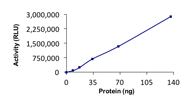
UBE2D2 (UBC4), Active(U214-380H)
FOR BULK ORDER REQUESTS PLEASE CONTACT US
Description :Recombinant full-length Xenopus UBE2D2 was expressed in E. coli cells using an N-terminal His tag.
Species :Xenopus
Tag :His tag
Expression System:E.coli
Sequence :Full length
Genbank Number :NM_001093036
Specific Activity :Sample Activity Plot. For specific information on a given lot, see related technical data sheet.
Purity :Sample Purity Data. For specific information on a given lot, see related technical data sheet.
Storage, Stability, and Shipping :Store product at –70oC. For optimal storage, aliquot target into smaller quantities after centrifugation and store at recommended temperature. For most favorable performance, avoid repeated handling and multiple freeze/thaw cycles.
Applications :Ubiquitin Enzyme Assay, Western Blot
Molecular Weight :17 kDa
Gene Aliases :UBC4; PUBC1; UBC4/5; UBCH5B; E2(17)KB2
Scientific Background :UBE2D2(UBC4) Protein or ubiquitin-conjugating enzyme E2D2 is a member of the E2 ubiquitin-conjugating enzyme family which functions in the ubiquitination of the tumor-suppressor protein p53, which is induced by an E3 ubiquitin-protein ligase. UBE2D2 specifically ubiquitinates E6AP and in vivo inhibition of UBE2D2 can lead to inhibition of E6-stimulated p53 degradation (1). UBE2D2 could conjugate ubiquitin to target proteins in an E6AP-dependent manner.
References :
1. Mondal, S. et al: A bioluminescent assay for monitoring conjugation of ubiquitin and ubiquitin-like proteins. Anal. Biochem. 510: 41-51, 2016 2. Rolfe, M. et al: Reconstitution of p53-ubiquitylation reactions from purified components: the role of human ubiquitin-conjugating enzyme UBC4 and E6-associated protein (E6AP). Proc. Nat. Acad. Sci. 92: 3264-3268, 1995. 3. Jensen, J.P.et al: Identification of a family of closely related human ubiquitin conjugating enzymes. J. Biol. Chem. 270: 30408-30414, 1995
Product Sheets (By Lot #) :
Research Areas :Cancer, Cell Cycle, Neurobiology
